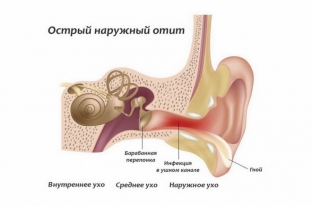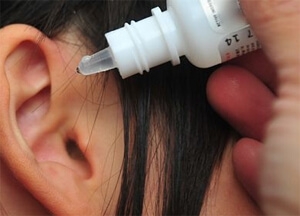Merry bathing can turn into sad consequences. Summer otitis media is also called swimmers' otitis media, because it is water from reservoirs that has entered the external auditory canal that can cause an infectious process, emphasizes estet-portal.com. It is difficult not to notice this ailment, because the inflammation is visible to the naked eye – the ear becomes red and protrudes a little, there may be a feeling of congestion. In this case, self-medication is not worth it, because the infection can spread to surrounding tissues, up to the brain. Find out what safety rules while swimming can keep you healthy.
What types of otitis are most common?
Otitis media – the disease is not only the cold season, it is quite possible to catch it in the summer, especially after being in the water. It is often accompanied by:
- temporary hearing loss,
- pain, aggravated by chewing.
There are three types of otitis media:
- external,
- medium,
- internal.
In the summer, there is a high probability of encountering the first two.
Swimmer's otitis can also occur due to hypothermia. The disease can be provoked by strong temperature contrasts.
For example, otitis media can occur in a person who sunbathed for an hour and then decides to take a running dive into a cold river.
Features of otitis externa
With otitis externa, inflammation is localized in the area of the external auditory canal. The disease may be accompanied by the appearance of furuncles and pustules.
Because freshwater ponds and lakes are inhabited by a lot of bacteria, they can cause inflammation even with minor violations of the skin.

Features of otitis media
With regard to otitis media, in this case, inflammation is associated with a change in pressure in the tympanic cavity, located immediately behind the tympanic membrane. This problem can be encountered when diving. It is especially dangerous to explore the underwater world without curing a cold, because then the likelihood of otitis media is especially high.
Read also: Sink into summer: why do we get sick in the heat
Symptoms and Treatment of Swimmer's Otitis
Symptoms of swimmer's otitis media usually do not appear immediately. And a few days after water enters the auricle. With external otitis, the following pronounced symptoms are observed:
- throbbing pain that can radiate to the eyeball, teeth and cervical region,
- increases on contact with the ear,
- occurs often at night,
- there is redness of the auricle itself,
- swelling of the tissues around it is fixed,
- sometimes boils appear,
- feel ear fullness,
- may have a slight increase in temperature.
Primary treatment for swimmer's otitis
The specialist will be able to prescribe several drugs:
- antibacterial ointments,
- antiseptics,
- antibacterial drops.
 If there is severe pain, local painkillers in the form of drops or oral medicines based on ibuprofen are prescribed. Ordinary vasoconstrictor nasal drops are excellent for relieving inflammation in the area of the external auditory canal and middle ear.
If there is severe pain, local painkillers in the form of drops or oral medicines based on ibuprofen are prescribed. Ordinary vasoconstrictor nasal drops are excellent for relieving inflammation in the area of the external auditory canal and middle ear.
During the treatment, the ear should not be wetted, kept warm. The ear canal should be closed with a cotton swab, and the ear with a scarf, but you do not need to warm up the ear!
Also, during treatment, it is worth avoiding the consumption of fast carbohydrates, since an increase in blood glucose provokes the development of an infection.
How to properly prevent otitis media?
To avoid inflammation of the external auditory canal and middle ear, it is enough to follow the rules of hygiene and not ignore even the common runny nose. In addition, in order to avoid the recurrence of this unpleasant disease, it is worth adhering to the following rules of conduct:
- While swimming (especially in fresh water), swim earplugs should be worn.
- Ears should be cleaned carefully– any injury to the skin in the external auditory canal, even the most insignificant, can result in the development of otitis media. Don't clean your ears too often, because sulfur is a barrier to pathogenic bacteria and fungi.
- After bathing, gently remove water from your ears with rolled up cotton pads. Also, after water procedures in a pond, it is necessary to rinse the ears with clean running water.
- Purge your ears– when diving without a mask, when you feel a strong bursting in your ears, pinch your nose with your fingers and slowly exhale part of the air from your lungs. If you are diving with a mask on, try some swallowing movements. To avoid a sudden change in pressure, dive into & nbsp; depth and emerge slowly.
- Treat your runny nose. In no case should you swim until you are fully recovered.
- Before entering the water, cool down – stay a little in the shade, and only then you can swim.
We hope that our advice will be useful, and your summer vacation will not be overshadowed by such unpleasant problems. And how do you protect yourself from otitis, write about your experience on estet-portal.com.






Add a comment